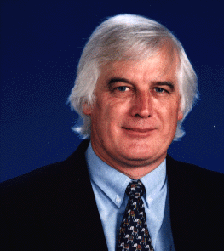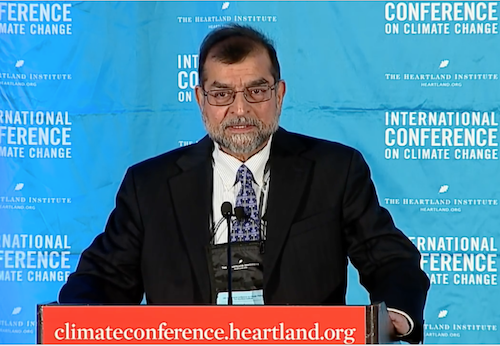Ian Byatt
Credentials
- D.Phil. Economics, University of Oxford (1957)1“Ian Byatt,” LinkedIn. Archived .pdf on file at DeSmog.
- B.A., St. Edmund Hall, University of Oxford2“Ian Charles Rayner Byatt,” Debretts. Archived September 4, 2014. Archive URL: https://archive.is/IfPIY
Background
Ian Byatt is a British economist who was the chairman of the Water Industry Commission for Scotland (WICS), the economic regulator of the water industry in Scotland, between 2005 and 2011.3“Sir Ian Byatt Honorary Fellow,” St Edmund Hall University of Oxford. Archived August 27, 2020. Archive.fo URL: https://archive.fo/Rf48P
In 2007, BBC reported Byatt was “at the centre of conflict of interest allegations” while he was chairman of WICS over the handling of a £1.5m contract (roughly US $2.1 million in 2023 dollars ) that was awarded to Frontier Economics, a microeconomics consultancy Byatt “has a close association with.”4“Sir Ian Byatt,” University of Oxford. Archived August 27, 2020. Archive URL: https://archive.ph/bV8FZ BBC noted Byatt had “been senior associate with Frontier since 2000 and also works as a highly paid consultant for the company.” According to BBC, Byatt did not mention this potential conflict of interest to the commission until a day before the contract was awarded. 5Mark Daly. “Probe reveals contract concerns,” BBC News, September 11, 2007. Archived August 27, 2020. Archive.fo URL: https://archive.fo/joaYs
Ian Byatt has been a member6“Sir Ian Byatt,” Global Warming Policy Foundation, November 20, 2009. Archived August 27, 2020. Archive.fo URL: https://archive.fo/62t6R of the Global Warming Policy Foundation‘s academic advisory council since its creation in 2009, sitting alongside other known climate science deniers such as Princeton professor emeritus William Happer, MIT professor emeritus Richard Lindzen, coal baron Matt Ridley, and former Shell board member Fritz Vahrenholt..7“Academic Advisory Council,” Global Warming Policy Foundation. Archived August 27, 2020. Archive.fo URL: https://archive.fo/lk1cd
Byatt is currently a member of the Public Interest Committee at RSM Audit UK,8“Sir Ian Byatt Honorary Fellow,” St Edmund Hall University of Oxford. Archived August 27, 2020. Archive.fo URL: https://archive.fo/Rf48P as well as an honorary fellow at both Birkbeck University of London and St. Edmund Hall at the University of Oxford.9“Fellow of the College,” Birkbeck University of London. Archived August 27, 2020. Archive.fo URL: https://archive.fo/Kk7ZL
Ian Byatt was director general of the Office of Water Services (Ofwat), the economic regulator of the water industry in England and Wales, from its inception in 1989 until 2000.10“Sir Ian Byatt Honorary Fellow,” St Edmund Hall University of Oxford. Archived August 27, 2020. Archive.fo URL: https://archive.fo/Rf48P
Ian Byatt was deputy chief economic advisor in Her Majesty’s Treasury, the UK’s economic and finance ministry, from 1978 to 1989. Byatt “contributed to the supply side reforms of the 1980s, under Margaret Thatcher.” 11“Sir Ian Byatt Honorary Fellow,” St Edmund Hall University of Oxford. Archived August 27, 2020. Archive.fo URL: https://archive.fo/Rf48P
During some of this time, Byatt worked under then-Chancellor of the Exchequer Lord Nigel Lawson, the founder the Global Warming Policy Foundation (GWPF).12“Sir Ian Byatt Honorary Fellow,” St Edmund Hall University of Oxford. Archived August 27, 2020. Archive.fo URL: https://archive.fo/Rf48P
Ian Byatt was the head of the Public Sector Economic Unit between 1972 and 1978.13“Sir Ian Byatt Honorary Fellow,” St Edmund Hall University of Oxford. Archived August 27, 2020. Archive.fo URL: https://archive.fo/Rf48P
Ian Byatt was knighted “Sir Ian Byatt” in the Queen’s Birthday Honours in 2000.14“The Queen’s Birthday Honours 2000,” BBC News, June 16, 2000. Archived August 27, 2020. Archive.fo URL: https://archive.fo/DPXNr
Stance on Climate Change
Ian Byatt has often disputed the scientific consensus that human activities are the primary causes of climate change, and that climate change could have catastrophic consequences.15Ian Byatt. “Memorandum by Sir Ian Byatt,” Parliament Select Committee on Economic Affairs, March 29, 2005. Archived August 27, 2020. Archive.fo URL: https://archive.fo/DcKbD Byatt has also opposed climate policies and the reduction of CO2 emissions as too expensive.16Ian Byatt. “Economic consequences of Climate Change Policies: Mired in the environmentalism of the NGOs,” Climato Realistes, December 7, 2017. Archived August 27, 2020. Archived .pdf on file at DeSmog.
Key Quotes
December 7, 2017
Ian Byatt gave a talk at a conference organized by the Association des Climato-Réalists, “Climat: contre la pensée unique.” The Association des Climato-Réalists is a French “climate realist” group which sits under a larger coalition of anti-climate organizations called the European Climate Realist Network. GWPF is also in the coalition.
In his talk, Ian Byatt likened environmental activism to a religion:17Ian Byatt. “Economic consequences of Climate Change Policies: Mired in the environmentalism of the NGOs,” talk presented at the Association des Climato-Réalists conference “Climat: contre la pensée unique,” December 7, 2017. Archived August 27, 2020. Archived .pdf on file at DeSmog.
“Politics seems, increasingly, to consist of virtue signalling. Much of the green language of environmentalism has a religious flavour.
Byatt criticized environmentalists and those who agreed with them as too rigid:
“Environmental pressure groups provide both the inspiration for the virtuous and the votes for the aspiring politician. They emphasise ‘the tragedy of the commons”’ not the power of innovation. They stress the consensus in science, not its challenges and its search for new information.
“With virtue comes certainty; rules crowd out compromises, negating the value of cost-benefit analysis, which has become a tool to convince rather than to question.”
Ian Byatt cited Rupert Darwall, David Henderson, Nigel Lawson, Peter Lilley, Benny Peiser, and Matt Ridley – all who have worked to delay climate action – as those who were “attempting to set the record straight” on “bien pensant liberals” and their “virtuous behaviour.”18Ian Byatt. “Economic consequences of Climate Change Policies: Mired in the environmentalism of the NGOs,” talk presented at the Association des Climato-Réalists conference “Climat: contre la pensée unique,” December 7, 2017. Archived August 27, 2020. Archived .pdf on file at DeSmog.
In his talk, Byatt argued that policies in the UK which have sought to reduce carbon emissions, like the 2008 Climate Change Act, have “come at a high price” and would “bear particularly heavily on vulnerable companies and poorer households.”19Ian Byatt. “Economic consequences of Climate Change Policies: Mired in the environmentalism of the NGOs,” Climato Realistes, December 7, 2017. Archived August 27, 2020. Archived .pdf on file at DeSmog.
Byatt stated that temperatures had “risen at a rate well below the 2°C that the IPCC considers dangerous, and much less than predicted by many climate change models.” He listed four criticisms of climate change policies:20Ian Byatt. “Economic consequences of Climate Change Policies: Mired in the environmentalism of the NGOs,” Climato Realistes, December 7, 2017. Archived August 27, 2020. Archived .pdf on file at DeSmog.
“Constant availability of electricity is essential to the efficient operation of our economy. Climate change policies, by raising the cost of energy, are more damaging than the alleged disease: the costs of renewables are greater than the costs of fossil fuels; the intermittency and unpredictability of wind and solar power leads to problems in operating an electrical grid; installation of a high percentage of renewable generation involves virtual duplication of the electricity generation and transmission systems; and government monopoly crowds out competition.”
The talk was subsequently reposted by the Global Warming Policy Foundation.21“Sir Ian Byatt: The Economic Consequences of UK Climate Change Policies,” GWPF, December 7, 2017. Archived August 27, 2020. Archive.fo URL: https://archive.fo/N2NHs
March 29, 2005
In a memo to the Parliament Select Committee on Economic Affairs, Byatt disputed the scientific consensus on the human causes of climate change, and said it was too soon to know for sure that rising temperatures could become catastrophic:22Ian Byatt. “Memorandum by Sir Ian Byatt,” Parliament Select Committee on Economic Affairs, March 29, 2005. Archived August 27, 2020. Archive.fo URL: https://archive.fo/DcKbD
“My own reading of the evidence is that many of the scientific issues surrounding climate change remains unsettled. More importantly, in my view, there are a number of economic issues that have not been adequately addressed. It is premature to conclude that any human-induced global warming would necessarily occur rapidly and further, that any such warming would be catastrophic.
[…]
“Temperatures have risen in recent years. There is insufficient evidence, however, that this represents a lasting change in long-term trends, or that human activities are solely or primarily responsible for these changes, or that single remedies, such as radical cutting of carbon emissions, will reverse them. The history of our climate shows significant, yet imperfectly understood, changes in the past.
[…]
“I conclude that there is neither sufficient evidence to forecast the “hockey stick” changes emerging from the IPCC work now set out in the Government’s Paper on Energy (DTI Our energy future: creating a low carbon economy. Cm 5761. 2003), nor to justify the drastic action thought necessary.”
Key Deeds
2008
Ian Byatt contributed a chapter to a book called “Climate Change Policy: Challenging the Activists,”23Colin Robinson, ed. “Climate Change Policy: Challenging the Activists,” Institute of Economic Affairs, London, 2008. Archived August 27, 2020. Archive.fo URL: https://archive.fo/xbYfD published by the Institute of Economic Affairs – a London-based free-market think-tank.24“Climate Change Policy: Challenging the Activists,” Institute of Economic Affairs/Colin Robinson. Archived August 27, 2020. Archived .pdf on file at DeSmog.
In his chapter, Byatt challenged the “Stern Review on the Economics of Climate Change,” an influential 2006 report, published by the UK government, which found the economic impacts of climate change would be significantly more costly in the future than the costs cutting emissions in the present. Byatt claimed the report “exaggerates the costs that may be associated with emissions of greenhouse gases.”25“Climate Change Policy: Challenging the Activists,” Institute of Economic Affairs/Colin Robinson. Archived August 27, 2020. Archived .pdf on file at DeSmog. 26“Climate change fight ‘can’t wait’,” BBC News, October 31, 2006. Archived August 27, 2020. Archive.fo URL: https://archive.fo/minNC
December 2006
Ian Byatt co-authored a two-part piece in a journal called World Economics, titled “The Stern Review: A Dual Critique.” The first part of the article criticized the Stern Review for a supposed “mishandling of basic observational data relating to climate change and the factors that bear on it.” 27Andrew Glickson, Ian Byatt et al. “The Stern Review: A Dual Critique,” World Economics, 8(1): 233 – 238, October-December 2006. Archived August 27, 202028. Archived .pdf on file at DeSmog.
In its second part, Byatt and co-authors criticized the Stern Review for “biased alarmism” and “model-based speculations.” They charged that the report grossly misrepresented the cost of climate action in relation to the effect on climate change:29Andrew Glickson, Ian Byatt et al. “The Stern Review: A Dual Critique,” World Economics, 8(1): 233 – 238, October-December 2006. Archived August 27, 202030. Archived .pdf on file at DeSmog.
“The treatment of costs and benefits in the Stern Review is deeply flawed. First, the Review either overlooks or sets aside important elements of the professional literature in favour of its own views, which read as outliers by comparison. Second, whereas the Review is biased towards technological
pessimism when assessing the costs of climate change, it is equally (and inconsistently) biased towards technological optimism concerning largescale mitigation efforts, alternate energy, and so forth. Its treatment of the issues is neither balanced nor credible.”
The paper’s co-authors included many figures active in the climate denial world. Co-authors of part one of the paper, “The Science,” included:31Robert M. Carter, Ian Byatt et al. “The Stern Review: A Dual Critique,” World Economics, 8(1): 233 – 238, October-December 2006. Archived August 27, 2020. Archived .pdf on file at DeSmog.
- Robert M. Carter
- C.R. de Freitas
- Indur M. Goklany
- David Holland
- Richard S. Lindzen
Along with Ian Byatt, authors of part two, “Economic Aspects,” included:
- Ian Castles
- Indur M. Goklany
- David Henderson
- Nigel Lawson
- Ross McKitrick
- Julian Morris
- Alan Peacock
- Colin Robinson
- Robert Skidelsky
June 2006
Ian Byatt was the lead author of a paper in the journal World Economics that criticized materials related to the Stern Review, as well as the content of Nicholas Stern’s recent Oxonia Lecture at the Oxford Institute for Economic Policy. They claimed that contrary to the papers and speech, there were still open questions on the cause of climate change and its potential catastrophic impact”:32With Ian Castles, David Henderson, and Nigel Lawson. “The Stern Review ‘Oxonia Papers'” A Critique,” World Economics 7.2: 153, 2006.
“From all three papers, one would gather that the main scientific issues relating to climate change are now substantially settled…[T]he picture of reality thus presented is accepted and reproduced unquestioningly.
Nicholas Stern responded to their critique in the same issue World Economics:33Stern, Nicholas. “Reply to Byatt et al.,” World Economics 7.2: 153, 2006.
“Ian Byatt and his co-authors, in their critique of my OXONIA speech and paper on the economics of climate change,1…do not come to grips with the more difficult economic analysis which
is at the heart of the problem and which is central to the approach adopted by the Stern Review team.
Nevertheless, the criticisms merit a response, not least to correct the authors’ misapprehensions about the implications of uncertainty for policy and to re-assert the need to apply the tools of modern economics to the problem.
[…]
“Indeed, science has moved on since the IPCC report of 2001. In fact, the latest science suggests that the risks could be substantially greater than previously seen.
[…]
“In the absence of policies to correct the externalities and market imperfections associated with the emission of GHGs and with innovation, markets cannot be expected to deliver efficient or desirable outcomes. Further, fossil fuels, particularly coal, are available in sufficient abundance to make the
‘business-as-usual’ scenarios feasible. Trajectories of GDP and emissions can, and should, be very different from ‘business-as-usual’. This could, we shall argue, be achieved with fairly modest net initial costs relative to ‘business-as-usual’ but very large benefits from avoided damage later in the
century. Thus appropriate analysis must be non-marginal in the sense that it must be able to compare possible paths some of which perform very badly later in the century (i.e. those involving ‘business-as-usual’ now) with paths that take corrective action now and that allow continued growth. That is the type of analysis that the economics of climate change must grapple with. And it must go on to look at the policies and market structures that could support these very different trajectories; it is in this area of the difficult microeconomics of public policy that much of the hard work lies. The remarks of Byatt et al. show little awareness of the importance of getting to grips with these vital issues.”
Affiliations
- Global Warming Policy Foundation – Member of the academic advisory council 34“Sir Ian Byatt,” Global Warming Policy Foundation, November 20, 2009. Archived August 27, 2020. Archive.fo URL: https://archive.fo/62t6R
- Institute of Economic Affairs – Authored chapter of book published by the institute, “Climate Change Policy: Challenging the Activists” 35Colin Robinson, ed. “Climate Change Policy: Challenging the Activists,” Institute of Economic Affairs, 2008. Archived August 27, 2020. Archived .pdf on file at DeSmog.
Social Media
- “Ian Byatt” on LinkedIn
Publications
- Robert M. Carter, Ian Byatt, et al. “The Stern Review: A Dual Critique,” World Economics, 8(1): 233 – 238, October-December 2006.
- With Ian Castles, David Henderson, and Nigel Lawson. “The Stern Review ‘Oxonia Papers'” A Critique,” World Economics 7.2: 153, July 2006.
Image: Ian Byatt’s profile on LinkedIn
Resources
- 1“Ian Byatt,” LinkedIn. Archived .pdf on file at DeSmog.
- 2“Ian Charles Rayner Byatt,” Debretts. Archived September 4, 2014. Archive URL: https://archive.is/IfPIY
- 3“Sir Ian Byatt Honorary Fellow,” St Edmund Hall University of Oxford. Archived August 27, 2020. Archive.fo URL: https://archive.fo/Rf48P
- 4“Sir Ian Byatt,” University of Oxford. Archived August 27, 2020. Archive URL: https://archive.ph/bV8FZ
- 5Mark Daly. “Probe reveals contract concerns,” BBC News, September 11, 2007. Archived August 27, 2020. Archive.fo URL: https://archive.fo/joaYs
- 6“Sir Ian Byatt,” Global Warming Policy Foundation, November 20, 2009. Archived August 27, 2020. Archive.fo URL: https://archive.fo/62t6R
- 7“Academic Advisory Council,” Global Warming Policy Foundation. Archived August 27, 2020. Archive.fo URL: https://archive.fo/lk1cd
- 8“Sir Ian Byatt Honorary Fellow,” St Edmund Hall University of Oxford. Archived August 27, 2020. Archive.fo URL: https://archive.fo/Rf48P
- 9“Fellow of the College,” Birkbeck University of London. Archived August 27, 2020. Archive.fo URL: https://archive.fo/Kk7ZL
- 10“Sir Ian Byatt Honorary Fellow,” St Edmund Hall University of Oxford. Archived August 27, 2020. Archive.fo URL: https://archive.fo/Rf48P
- 11“Sir Ian Byatt Honorary Fellow,” St Edmund Hall University of Oxford. Archived August 27, 2020. Archive.fo URL: https://archive.fo/Rf48P
- 12“Sir Ian Byatt Honorary Fellow,” St Edmund Hall University of Oxford. Archived August 27, 2020. Archive.fo URL: https://archive.fo/Rf48P
- 13“Sir Ian Byatt Honorary Fellow,” St Edmund Hall University of Oxford. Archived August 27, 2020. Archive.fo URL: https://archive.fo/Rf48P
- 14“The Queen’s Birthday Honours 2000,” BBC News, June 16, 2000. Archived August 27, 2020. Archive.fo URL: https://archive.fo/DPXNr
- 15Ian Byatt. “Memorandum by Sir Ian Byatt,” Parliament Select Committee on Economic Affairs, March 29, 2005. Archived August 27, 2020. Archive.fo URL: https://archive.fo/DcKbD
- 16Ian Byatt. “Economic consequences of Climate Change Policies: Mired in the environmentalism of the NGOs,” Climato Realistes, December 7, 2017. Archived August 27, 2020. Archived .pdf on file at DeSmog.
- 17Ian Byatt. “Economic consequences of Climate Change Policies: Mired in the environmentalism of the NGOs,” talk presented at the Association des Climato-Réalists conference “Climat: contre la pensée unique,” December 7, 2017. Archived August 27, 2020. Archived .pdf on file at DeSmog.
- 18Ian Byatt. “Economic consequences of Climate Change Policies: Mired in the environmentalism of the NGOs,” talk presented at the Association des Climato-Réalists conference “Climat: contre la pensée unique,” December 7, 2017. Archived August 27, 2020. Archived .pdf on file at DeSmog.
- 19Ian Byatt. “Economic consequences of Climate Change Policies: Mired in the environmentalism of the NGOs,” Climato Realistes, December 7, 2017. Archived August 27, 2020. Archived .pdf on file at DeSmog.
- 20Ian Byatt. “Economic consequences of Climate Change Policies: Mired in the environmentalism of the NGOs,” Climato Realistes, December 7, 2017. Archived August 27, 2020. Archived .pdf on file at DeSmog.
- 21“Sir Ian Byatt: The Economic Consequences of UK Climate Change Policies,” GWPF, December 7, 2017. Archived August 27, 2020. Archive.fo URL: https://archive.fo/N2NHs
- 22Ian Byatt. “Memorandum by Sir Ian Byatt,” Parliament Select Committee on Economic Affairs, March 29, 2005. Archived August 27, 2020. Archive.fo URL: https://archive.fo/DcKbD
- 23Colin Robinson, ed. “Climate Change Policy: Challenging the Activists,” Institute of Economic Affairs, London, 2008. Archived August 27, 2020. Archive.fo URL: https://archive.fo/xbYfD
- 24“Climate Change Policy: Challenging the Activists,” Institute of Economic Affairs/Colin Robinson. Archived August 27, 2020. Archived .pdf on file at DeSmog.
- 25“Climate Change Policy: Challenging the Activists,” Institute of Economic Affairs/Colin Robinson. Archived August 27, 2020. Archived .pdf on file at DeSmog.
- 26“Climate change fight ‘can’t wait’,” BBC News, October 31, 2006. Archived August 27, 2020. Archive.fo URL: https://archive.fo/minNC
- 27Andrew Glickson, Ian Byatt et al. “The Stern Review: A Dual Critique,” World Economics, 8(1): 233 – 238, October-December 2006.
- 28. Archived .pdf on file at DeSmog.
- 29Andrew Glickson, Ian Byatt et al. “The Stern Review: A Dual Critique,” World Economics, 8(1): 233 – 238, October-December 2006.
- 30. Archived .pdf on file at DeSmog.
- 31Robert M. Carter, Ian Byatt et al. “The Stern Review: A Dual Critique,” World Economics, 8(1): 233 – 238, October-December 2006. Archived August 27, 2020. Archived .pdf on file at DeSmog.
- 32With Ian Castles, David Henderson, and Nigel Lawson. “The Stern Review ‘Oxonia Papers'” A Critique,” World Economics 7.2: 153, 2006.
- 33Stern, Nicholas. “Reply to Byatt et al.,” World Economics 7.2: 153, 2006.
- 34“Sir Ian Byatt,” Global Warming Policy Foundation, November 20, 2009. Archived August 27, 2020. Archive.fo URL: https://archive.fo/62t6R
- 35Colin Robinson, ed. “Climate Change Policy: Challenging the Activists,” Institute of Economic Affairs, 2008. Archived August 27, 2020. Archived .pdf on file at DeSmog.





